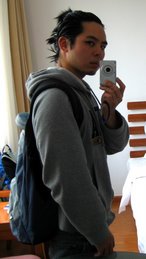I recently developed a new doctrine that says anyone buying just one book at a time is a philistine. Naturally, there are allowances that I have to make, for example: someone buying just a book as a gift; those under financial constraints; a student purchasing a textbook. I'm talking about normal people purchasing leisure or pleasure reading material--sufficient to say, people who don't read are given the unfavorable designation of "sub-philistine."
On what basis did I develop this new theory? The primary rationale is that if you're not buying a good variety of books, then you're not getting diversified reading. My fun new theory doesn't really account for one who simply buys many books of the same genre, or of the same opinions, or thoe who buy different types of literature, but on separate trips to the bookstore. I suppose I could just change my new doctrine to "Anyone not without a well-balanced reading diet is a philistine," but that's so much less catchy than my original dictum.
My new truism in mind, I went to Barnes & Noble the other day looking for The Letters of Lady Mary Wortley Montagu. I have taken to "three" as a favorite multiple in which to purchase books: two seems so minimally above the troglodyte's one; four can be expensive, and a bit too many to read in a reasonable amount of time. My recipe for success has recently been: 1. something from the 18th century to prepare me for graduate school; 2. recent non-fiction (almost always culled from NPR recommendations) to expand my understanding of the modern world; and 3. something fun--usually essays, or something by David Sedaris or Sandra Tsing Loh.
To my dismay, my good friends at Barnes & Noble did not have The Letters of Lady Mary Wortley Montagu--an offense which, in the fickle world of my allegiances, pushed them further from the appellation of "friends," and closer to "evil, untutored cretins." I was forced to replace this item in my "18th century" category with Jonathan Swift's Gulliver's Travels. The Year of Magical Thinking by Joan Didion, and The Oxford Book of Essays, a collection edited by John Gross, rounded out my purchase.
The latter book has proved quite diverting; the selection begins with Sir Francis Bacon, moves through John Dryden, Samuel Johnson, Carlyle, Twain, Pater, Woolf, Eliot, and up to Philip Larkin and Gore Vidal. [Incidentally, it contains essays by both Jonathan Swift and Joan Didion!] Though I initially scoffed at the $20 price tag for a paperback compilation, with over 150 essays in nearly 700 pages, it's actually quite a deal. Some essays are touching, others humorous, a few even very insightful. It's arranged chronologically, so it allows the reader to track the development of the essay, changes in the Western paradigm, and the evolution of the way people have used modern English through the centuries.
Some early practitioners of the essay favored titles like "On War," "On the Pleasure of Hating," "On Dreams," or "On Recollections of Childhood." So I decided to pay homage to them with this entry's name, a reference to my stubby legs.
I have long considered the disproportion of my torso and lower body. In high school, Pam often remarked that her legs are about the same length as (or possibly longer than) mine, despite the fact that she is a good 2-3 inches shorter than I. One of my college roommates is 6'7", making him tower a full foot above me. When we sit down beside one another, we were nearly the same height, the discrepancy in our body size thus owing almost entirely to his gangling, long legs, and my regrettably short stubs. Sometimes I think about this when I buy a new pair of pants, because I must always choose the shortest inseam.
I was recently reminded of my stubs by my efforts to forestall the inevitable end of Naruto; Alvin and I have begun watching Bleach, another anime series. It focuses on Kurosaki Ichigo, a high school teen who, in addition to the normal traumas of adolescence, must use his newfound skills as a shinigami, or death-god, to save the world. And how just how does he manage to juggle all these tasks? He saves alot of time in transit, thanks to his marvelously long legs!
As I watched a recent episode, I noticed (enviously) how slender his body frame is, how sleek and long his legs. If my legs were in proportion to my torso, I could easily be another two to three (maybe even four!) inches taller. I came to despise my legs, which seemed more appropriate for Frodo Baggins than me.
I relayed these concerns to Pam, who is also a big Bleach fan. Her response?
"We all get new bodies in heaven, so don't worry about it. Our glorified bodies will be perfect."
"That's true. So I'll have nice long legs in eternity?"
"Maybe you'll have the same legs. Maybe your legs are the ideal legs."
"Yes," I thought to myself, "maybe my legs really are the ideal legs! Look at all those people with their awkward, elongated limbs! They look as though they were stretched out on some Medieval torture rack. Ridiculous and unwieldy. And it's so sad: they've been duped into believing that their gangling femurs and tibia are attractive! Thank goodness that I have the perfect legs." And off I walked, proudly, to my Prius--on my stubs.
Subscribe to:
Post Comments (Atom)


No comments:
Post a Comment